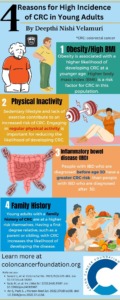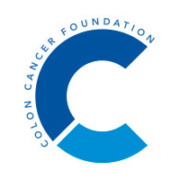Colorectal Cancer in Young Adults: What Are We Learning?
By Deepthi Nishi Velamuri
Colorectal cancer (CRC) is a disease that typically affects older adults, but it is becoming increasingly common in young adults. In fact, data indicate that 15% of patients diagnosed with CRC in the U.S. are under the age of 50 years and the mean age at diagnosis is 42.5 years.
There are a number of factors that may contribute to the rising risk of CRC in young adults. These include:
- Changes in diet and lifestyle: Young adults are more likely to eat a diet high in processed foods and red meat, and to be less physically active than previous generations. These factors can increase the risk of developing CRC. Young adults with CRC are more likely to be obese. This suggests that obesity may be a modifiable risk factor for the disease in young adults.
- Genetics: Some people have a genetic predisposition to CRC. If you have a family history of the disease, you are at an increased risk.
- Inflammatory bowel disease: People with inflammatory bowel disease, such as ulcerative colitis or Crohn’s disease, are also at an increased risk of CRC.
Prevention, Genetics, and Disease Outcomes
The good news is that CRC is often preventable. If you are at an increased risk, you should talk to your doctor about getting screened for the disease. Screening can help identify polyps, which are growths that can develop into cancer. If polyps are found, they can be removed before they have a chance to turn cancerous.

Young adults diagnosed with CRC are more likely to have advanced-stage disease at the time of diagnosis. This suggests that young adults are less likely to be screened for the disease—often despite showing symptoms such as rectal bleeding, abnormal or changing bowel patterns, fatigue, etc—which can lead to later-stage diagnosis and poorer outcomes.
A number of genetic mutations associated with CRC in young adults have been identified. These mutations can help identify people who are at an increased risk of the disease, and they can also be used to develop new targeted therapies.
Need for Improved Management of Young Adults
While we are still trying to understand the mechanism of CRC development in young adults, it is clear that this is a serious and growing problem. By understanding the risk factors for the disease and getting screened, young adults can protect themselves from CRC.
Here are some tips to reduce your risk:
- Eat a healthy diet that is low in processed foods and red meat
- Get regular exercise
- Maintain a healthy weight
- Don’t smoke
- Limit your alcohol intake
- Talk to your doctor about getting screened for CRC if you are at an increased risk
Deepthi Nishi Velamuri is a Colorectal Cancer Prevention Intern with the Colon Cancer Foundation.









Leave a Reply
Want to join the discussion?Feel free to contribute!